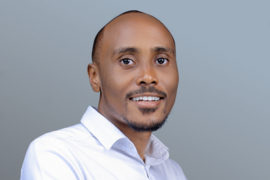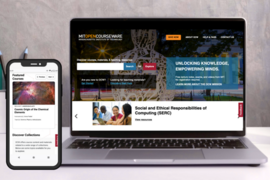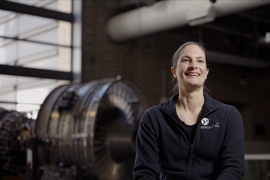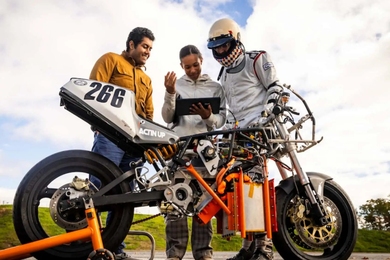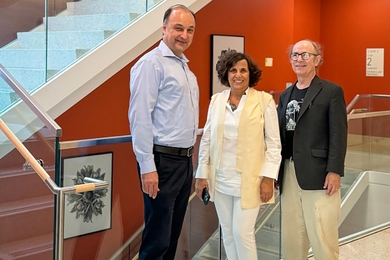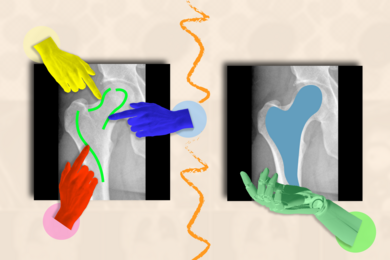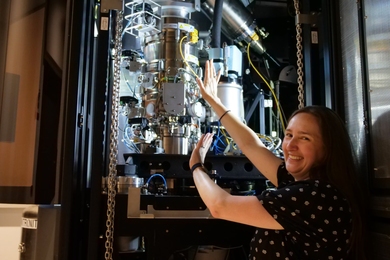About two years ago, a group of medical students at Ege University Faculty of Medicine in Turkey began meeting to study single variable calculus. None of the students had taken a course in this subject before. But with the guidance of lectures, slides, and other freely available resources on MIT OpenCourseWare (OCW), they soon advanced onto multivariable calculus. Then differential equations. Then linear algebra.
Today, the students, who call their study group İleri Çalışmalar, or “Advanced Studies,” are paving their own road toward doctoral-level studies — with MIT OCW as their main resource. “Our motivation is to create a theoretical background in order to do research while we’re studying in medical school,” says Yıldırım Adalıoğlu, one of the study group’s co-founders, who explains that MD-PhD programs, which prepare students to become both clinicians and researchers, have only recently become available in Turkey, and are rare. “We didn’t have the chance to do doctoral-level research during medical school. We decided to create that for ourselves.”
Using OCW courses to build their own curriculum, the members of İleri Çalışmalar have developed an independent program of study while working toward their medical degrees. The study group devotes about three months — the equivalent of an MIT semester — to each course in their curriculum. While most of their peers are on the clinician path, the group co-founded by Sıla Özkal, Begüm Tahhan, and Çağan Kaplan typically draws six to 10 students per course.
Support and collaboration to pursue focused interests
Depending on their schedule, Kaplan explains, the students meet weekly to discuss the OCW lectures and to review course materials. At each meeting, one or more members of the group volunteer to recap the lectures and to facilitate discussion. For new courses — like probability, the group’s current focus — the students approach discussion sessions collaboratively. “After nearly two years of medical coursework,” Adalıoğlu says, “we can now teach and adapt the earlier courses for new students as well.”
The group also brainstorms potential research projects, some of which they have already carried out, independently and in collaboration with faculty from other departments and labs. For instance, over the summer a few students from the group interned at a biomedicine and genome research center. They drew on the knowledge they gained from classes 6.0001 (Introduction to Computer Science and Programming in Python) and 6.0002 (Introduction to Computational Thinking and Data Science) to work on a study on analyzing the effects of mutations in a specific protein. The internship called for a background in computational research and data analysis. Thanks to MIT OCW, the İleri Çalışmalar students were well-prepared, says Adalıoğlu. “If we didn’t have the Python course from MIT, then we couldn’t go to the lab and do the internship there.”
Combining their medical interests with their OCW coursework, Adalıoğlu and Kaplan also developed a computational model to study the Covid-19 pandemic in Germany. They’re now in the process of trying to publish their findings. “OCW broadens our horizons,” Kaplan says. Adalıoğlu adds, “If we want to do computational research, it’s mainly up to us. There aren’t many people on the medical faculty that work on computational projects. That’s why when we decide to do a computational project, either we solve the problems ourselves or we ask for help from professors from other universities and labs.”
For Tahhan, who interned at a government science institute, where she studied hyperlipidemia in pediatric patients, the OCW courses have opened new areas of interest. “I realized I was interested in biochemistry when I took the 5.08J Biological Chemistry II course from OCW, so I applied for the internship,” she says. Özkal, who attends a cancer research internship, also credits the OCW courses that İleri Çalışmalar has covered with advancing her research goals.
The tool kits to build their own future
Currently in their third and fourth years of medical school, the İleri Çalışmalar founders note that OpenCourseWare has been a useful supplement to their medical studies as well. While studying the human gastrointestinal system, for example, they revisited the biological chemistry course materials to better understand the biochemical pathways that lead to absorption. “When we are confused about any subject, we can always go back to OCW and search for the slides,” says Kaplan.
“We all want to do novel research and study the topics that allow people to understand our universe better. That’s why we started medical school, that’s why we want to do a PhD after medical school,” Adalıoğlu says. “We all love medicine and we love pathology, physiology, learning about diseases — we want to solve the problems that come from these diseases, but we need the tool kits to do research. Thanks to MIT OpenCourseWare and our own efforts, I hope we can create some vision — a path for other students after us.”



